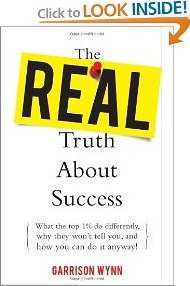The Real Truth about Success is the culmination of ten years’ worth of interviews with more than 5,000 top performers in their fields. During the process, Author Garrison Wynn discovered that better brains, a positive attitude, and superior all-around quality rarely drive true success. Rather, the most successful people in the world leverage their unique, distinctive qualities - whatever they may be - to propel themselves to the front of the line.
This book helps you:
• Discover (or create) your own personal advantage
• Align it with the most appropriate goals
• Transition from self-knowledge to repeatable implementation
• Relentlessly put your advantage to practical use
• Bask in the sunshine of well-deserved success
All of us have a personal advantage we can use to stack the cards in our own favor. What’s yours? High intelligence? Good looks? Likability? Great connections? (Your unfair advantage may well be a talent for leveraging other peoples’ unfair advantage.)
Excerpt:
The myth of positive thinking says that, to be successful, it's most important to believe you can succeed. That sounds great - except that when you talk to people who are tremendously successful, you learn they did more than just believe: They thought negatively. Many professionals have reached the top of their industry because an undercurrent of their own negativity helped them to avoid being blindsided and to prepare for circumstances that could have impeded their progress. They looked ahead to see what problems and obstacles they'd have to kick to the curb. As a result, they didn't hit many road blocks they hadn't anticipated or planned for.
In fact, a January 2007 study from Jing Zhou, associate professor of management at Rice University's Jesse H. Jones Graduate School of Management, showed that negativity in the workplace can be an effective catalyst for improvement and progress. Zhou suggests that managers should think twice about viewing negativity is an undesirable trait that they should weed out of their workforce. "A sense of dissatisfaction with the status quo, with the way things are right now, can push people to develop ideas and find creative solutions" Zhou explained in an interview.
Aha! This explains those cranky people who tend to get under your skin because they actually have good ideas. The study supports the idea that negative thinkers actually fare better than optimists because they've anticipated problems, trends, and instability and are likely to plan to move beyond those fluctuations. Rather than rely on self-assurance to carry them along ("I can do this, I can do this, I can do this!"), they acquire a little self-insurance ("I can do this because adverse situations A, B, and C can no longer prevent me from doing it").
I'm not saying that there's anything wrong with optimism. Honestly, optimists are far more fun to be around. I'm suggesting that the faster track to success is peppered with pessimism. The simple truth that undercuts the power-of-positive-thinking myth is this: When it comes to success, people who see a glass half empty are more likely to fill up the glass than people who see it half full.
Reader Tim Johnson of Houston, Texas says, "Garrison Wynn's The Real Truth about Success nails it. Most books on success try to tell us how we can change to be successful. Wynn shows us how each of us already have unique attributes that we can leverage to gain an unfair advantage. I've never read a book on success that so clearly explains what our real assets and advantages are, and how to use innate gifts to succeed. Kudos to Garrison. He brings out a simple truth most of us never think about. Click here for more information.
More Success at Work Information:
• People Skills - Networking
• Diversity in the Workforce
• Dealing With Employee Insubordination
• Being a Professional
• 40 Time Mastery Tips to Be in Control of Your Life
• People Skills - Working With Your Boss
• Techniques - A Cluttered Desk
• Good Cop Bad Cop
• Be more successful - Create ME INC.
• Techniques - Computer Literacy


